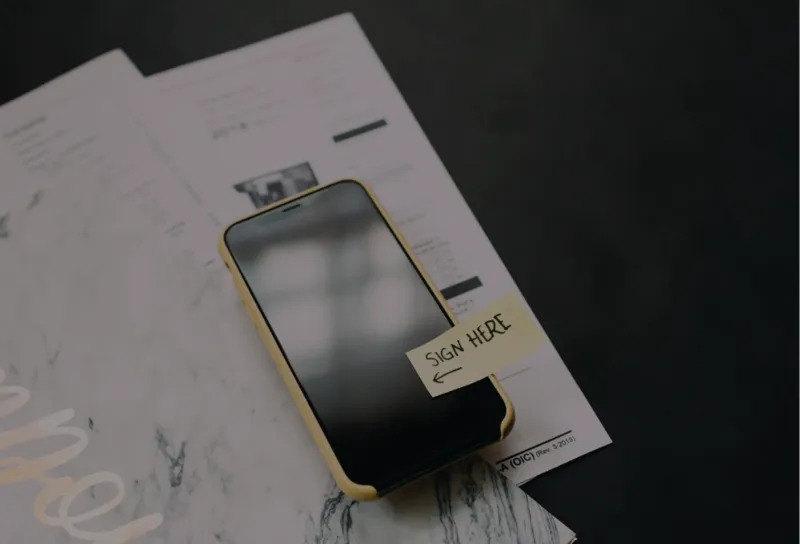What is an electronic signature?
An electronic signature enables a recipient to conveniently sign documents by typing their name out or simply clicking a button through a web browser, tablet, or mobile device.
Electronic signatures are encoded and encrypted in order to prevent the impersonation of a signee, tampering, and improve the security overall of every signed document.
Electronic signatures: tamper-proof documents
With a e-signature from GetAccept you receive a signed document that is tamper-proof and allows you to see any changes that may have been made to the document after signing. The digital signature uses a unique fingerprint that creates a certificate for the document at the time of signing and this is permanently embedded into the file. This makes it vendor-independent and totally tamper-proof.
Benefits of electronic signatures
Save time
No need to print, sign, scan and e-mail paper contracts. A digital contract can be signed in a few seconds and is electronically delivered to all parties involved.
Offer convenience
Let your buyers sign from anywhere in the world and at anytime. Whether from a desktop, tablet or mobile, all that's needed is an internet connection.
Secure your contracts
Ensure your contracts are signed safely with authentication and security features. Digital signatures guarantee a tamper-proof audit trail that are legally binding.
Track signing order
Electronic signatures allow you to create a signing order with your buyers and more easily track where the bottleneck is ... and give a push where needed.
of B2B buyers have finalized at least one business purchase with an e-signature.
of customers qualify their purchase experience as very complex or difficult.
Legal aspects
GetAccept provides you with a legally binding eSignature solution for your agreements and contracts. GetAccept complies with the requirements of the U.S. Electronic Signature in Global and National Commerce Act of 2000 (ESIGN), the Uniform Electronic Transactions Act (UETA), and the European Union eIDAS (EU No.910/2014) regarding electronic signatures and transmissions, which makes eSignatures fast, easy, and legally binding.
E-signature Law in the United States
GetAccept’s electronic signature solution in the United States complies with the definition of an electronic signature under the Electronic Signatures in Global and National Commerce (ESIGN) and the Uniform Electronic Transactions Act (UETA).
E-signature Law in the United Kingdom
In the United Kingdom, the equivalent legislation to the ESIGN Act in the United States is the Electronic Communications Act 2000. GetAccepts electronic signature solution complies with the definition of an electronic signature under this act.
E-signature Regulation in the European Union
In 2014, the European Parliament created a more uniform market for electronic transactions with the release of the EU Regulation No 910/2014 on electronic identification and trust services for electronic transactions in the internal market, also known as eIDAS. Electronic signatures are actively being used in Europe, and GetAccept’s eSignatures are compliant with eIDAS and EU electronic signature technical standards. You can read more about eIDAS below.
Signature authentication
GetAccept authenticates document signers so there is 100% transparency as to who is signing your documents. To protect all GetAccept user accounts, user information is transferred over 256-bit SSL encryption, including sensitive information like usernames and passwords. GetAccept also prevents others from accessing or using your account by imposing automated session time-outs and emailing you every time a contract is sent to, received by, or signed using an account.
Signature affixation
Each signature on a contract is imposed and affixed to the contract. GetAccept creates a comprehensive transaction trail between signing parties. To provide transaction history, we track and timestamp various information from the moment the document is submitted for signature to when it is completely signed and secured.
Full evidence log
A complete evidence log is a crucial factor to confirm when choosing an eSignature provider. Every send-out has a unique ID that reflects the contents of the document. GetAccept tracks the entire process and compiles it into a complete history of every action taken inside the document. Activities are marked with a trusted timestamp, email, IP number, and IP location.
Court-admissible transactions log
GetAccept creates a comprehensive transaction trail between signing parties. In order to provide this transaction history, we track and timestamp various information from the moment the document is submitted for signature to when it is completely signed and secured, such as IP information and UserAgent information. To ensure against any tampering with your transaction log, the transaction log is secured with hashing technology. This audit trail gives you a full evidence log to bring to court should any conflicts arise.
Electronic signatures and eIDAS
eIDAS is an EU regulation on electronic identification and trust services for electronic transactions that applies as law within the whole of the EU.
Electronic Identification, Authentication and Trust Services (eIDAS)
The goal of the eIDAS regulation, which started in 2014, is to facilitate the flow of commerce in the EU through transparency, security, technical neutrality, cooperation, and interoperability. In pursuit of these values, eIDAS:
- Standardizes the use of electronic identification (eID)
- Defines a new class of “electronic trust services” (eTS)
- Clarifies and ensures the legal validity of electronic signatures
- Creates a European internal market within the EU for electronic trust services
Different levels of electronic signatures
The eIDAS regulation defines three types of electronic signatures: (Basic) Electronic Signature, Advanced Electronic Signature, and Qualified Electronic Signature. According to eIDAS, an electronic signature is defined as “data in electronic form which is attached to or logically associated with other data in electronic form and is used by the signatory to sign”.
Basic electronic signature
A basic electronic signature can be any kind of signature made in an electronic and digital environment, where the signatory has manifested their intent (e.g. by clicking a button or checking a box) to become bound by the contents of the document signed.
GetAccepts standard "click to sign" solution is considered a very strong Basic electronic signature and sufficient for most business agreements.
Advanced electronic signature (AdES)
According to eIDAS, an advanced electronic signature shall meet the following requirements:
- uniquely linked to and capable of identifying the signatory;
- created in a way that allows the signatory to retain control;
- linked to the document in a way that any subsequent change of the data is detectable.
These elements of unique identity, control, and integrity of the signed document can be achieved through different means. A recognized eID assures secure authentication of the signatory’s identity in the online environment.
GetAccept has multiple ways of creating a Advanced Electronic Signature, for instance with the use of a eID or MFA solution.
Qualified electronic signature (QES)
According to eIDAS, “‘qualified electronic signature’ means an advanced electronic signature that is created by a qualified electronic signature creation device, and is based on a qualified certificate for electronic signatures.” The use of Qualified Electronic Signatures includes an extra layer of assurance and trust that results in a special legal effect that shall be recognized by courts in the EU.
From a legal perspective QES should in EU be equivalent to a "wet ink" signature and the burden of proof in a court is on the challenger.
GetAccept has thru an external partnership the possibility to offer QES seamlessly integrated into the signing workflow in most European countries. It should be noted that QES add a extra level of security but also complexity and cost to the signature flow.
Please contact us for more detailed information on QES.





